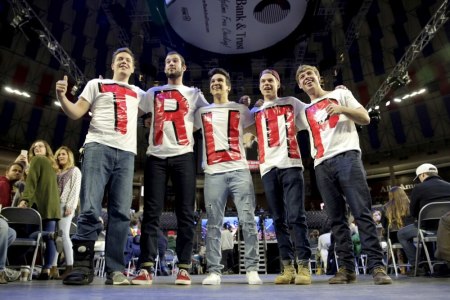Is Trump's base 'fake evangelicals'?

Are Trump's strongest supporters "fake evangelicals," those who identify as evangelical but don't attend worship or hold evangelical beliefs?
In "Who Wants to Make America Great Again? Understanding Evangelical Support for Donald Trump," published online last month in the journal Politics and Religion, Michele Margolis, assistant professor of political science at the University of Pennsylvania, finds that Trump's candidacy was indeed propelled by the nominally religious, but after he won the nomination, his relationship to highly religious evangelicals changed.
Many pundits have surmised that the strong Trump supporters were not devout evangelicals, but rather "fake evangelicals" or "EINO's" (evangelicals in name only), those who identified as evangelicals but don't go to church or hold evangelical beliefs. (I made this argument here and here.)
Others have argued that church decline helps explain the rise of Trump.
In Alienated America: Why Some Places Thrive While Others Collapse, for instance, Tim Carney, editor at the Washington Examiner and visiting fellow at the American Enterprise Institute, looked at the counties that gave Trump the strongest support during primary elections. He found a relationship between the collapse of religion, and other measures of societal decay, and support for Trump.
The Trump phenomenon is best understood as a symptom of the alienation of the white working class, Carney described, and, "The woes of the white working class are best understood not by looking at the idled factories but by looking at the empty churches."
Margolis did find that the most religious evangelicals were least supportive of Trump during the nomination contests.
The core of Margolis' analysis used a national survey of 2,000 American adults that oversampled 500 white evangelicals just a few weeks before the 2016 election, between Oct. 10 and 18.
Using a 0-7 additive scale of religious beliefs, the white evangelicals who held the most evangelical beliefs, scored 6 or 7, were the least supportive of Trump becoming the nominee, 18% and 14% respectively. Those who identified as white evangelicals but didn't hold many evangelical beliefs were more likely to support Trump. About twice as many, 34% of those who scored a 3 or less, and 38% of those who scored a 4, backed Trump.
However, nominal evangelicals were not Trump's strongest base of support. Trump did even better among non-evangelical whites, at 42%.
After Trump became the nominee, one might expect his strongest primary supporters to be his strongest supporters in the general election. But Margolis found that wasn't the case. In the general election, the results were roughly the opposite.
"Trump may have faced an electoral problem if devout evangelical Republicans who preferred another nominee decided to stay home or vote against Trump. But, among those who did not want Trump to be the nominee, it was the more devout evangelicals who rallied most strongly around the Republican candidate," she wrote.
Looking again at the evangelical beliefs scale, except for a slight drop in Trump support from 3 to 4 (Hillary Clinton's strongest white evangelical support came from those who scored a 4), Trump's support increased as evangelical beliefs increased. Among just the white evangelical Republicans, only 66% of nominal evangelicals (3 or lower) said they would support Trump in the general election, while 83% of strong evangelicals (those holding all 7 beliefs) said the same. This pattern held when Margolis controlled for other factors with a multivariate analysis.
Margolis compared these results to the 2012 election to understand why white evangelical Republicans were such strong Trump supporters and found two important factors — partisanship and negative partisanship. White evangelicals were loyal to Trump because Trump was the Republican and they're loyal Republicans, and because they were voting against the Democrats (Barack Obama in 2012 and Clinton in 2016).
"One implication of these results is that evangelical Republicans are unlikely to ever abandon the Republican candidate, as their dislike for Democratic candidates — and possibly the party as a whole — keeps them squarely in the Republican camp," Margolis wrote.
Margolis is also the author of From Politics to the Pews: How Partisanship and the Political Environment Shape Religious Identity (2018), which finds that partisanship and group identity often shapes religious beliefs, rather than vice versa.





















